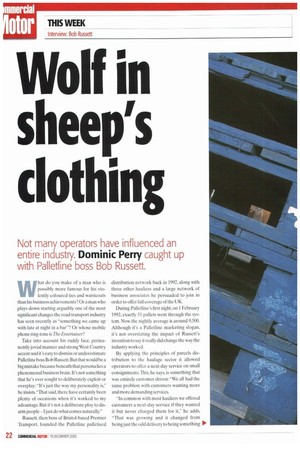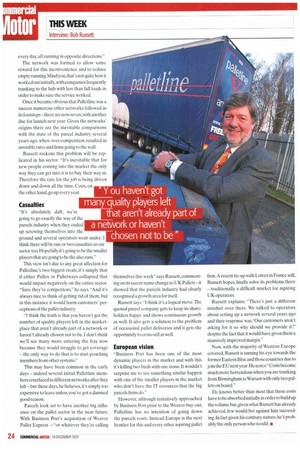Wol f in
Page 22

Page 24

If you've noticed an error in this article please click here to report it so we can fix it.
sheep's
clothing
Not many operators have influenced an entire industry. Dominic Perry caught up with Palletline boss Bob Russet.
What do you make of a man who is possibly more famous for his violently coloured ties and waistcoats than his business achievements? Or a man who plays down starting arguably one of the most significant changes the road transport industry has seen recently as "something we came up with late at night in a bar-? Or whose mobile phone ring-tone is The Entertainer?
Take into account his ruddy face, permanently jovial manner and strong West Country accent and it's easy to dismiss or underestimate Palletline boss Bob Russett. But that would be a big mistake because beneath that persona lies a phenomenal business brain. It's not something that he's ever sought to deliberately exploit or overplay: "It's just the way my personality is," he insists. "Thai said. there have certainly been plenty of occasions when it's worked to my advantage. But it's not a deliberate ploy to disarm people I just do what comes naturally."
Russell, then boss of Bristol-based Premier Transport. founded the Palletline palletised distribution network back in 1992, along with three other hauliers and a large network of business associates he persuaded to join in order to offer full coverage of the UK.
During Pa lletline's first night, on 1 February 1992, exactly 51 pallets went through the system. Now the nightly average is around 9,500. Although it's a Palletline marketing slogan, it's not overstating the impact of Russell's invention to say it really did change the way the industry worked.
By applying the principles of parcels distribution to the haulage sector it allowed operators to offer a next-day service on small consignments. This. he says, is something that was entirely customer driven: "We all had the same problem with customers wanting more and more demanding services.
"In common with most hauliers we offered customers a next-day service if they wanted it but never charged them for it," he adds. "That was growing and it changed from being just the odd delivery to being something 1110. every day, all running in opposite directions."
The network was formed to allow some reward for this inconvenience and to reduce empty running. Mind you,that's not quite how it worked out initially, with companies frequently trunking to the hub with less than full loads in order to make sure the service worked.
Once it became obvious that Palletline was a success numerous other networks followed in its footsteps— there are now seven, with another due for launch next year. Given the networks' origins there are the inevitable comparisons with the state of the parcel industry several years ago. when over-competition resulted in unviable rates and firms going to the wall.
Russett reckons this problem will be replicated in his sector: "It's inevitable that for new people coming into the market the only way they can get into it is to buy their way in. Therefore the rate for the job is being driven down and down all the time. Costs, on the other hand, go up every year.
Casualties
-It's absolutely daft; we're going to go exactly the way of the parcels industry when they ended up screwing themselves into the ground and several operators went under. I think there will be one or two casualties in our sector too. Hopefully it's going to be the smaller players that are going to be the also-rans."
This view isn't due to any great affection for Palletline's two biggest rivals; it's simply that if either Pallex or Palletways collapsed that would impact negatively on the entire sector. -Sure they're competitors," he says. "And it's always nice to think of getting rid of them, but in this instance it would harm customers' perceptions of the pallet industry.
think the truth is that you haven't got the number of quality players left in the marketplace that aren't already part of a network or haven't already chosen not to be. I don't think we'll see many more entering the fray now because they would struggle to get coverage — the only way to do that is to start poaching members from other systems" This may have been common in the early days — indeed several initial Palletline members resurfaced in different networks after they left — but these days, he believes, it's simply too expensive to leave unless you've got a damned good reason.
Parcels look set to have another big influence on the pallet sector in the near future. With Business Post's acquisition of Weaver Pallet Express —"or whatever they're calling themselves this week" says Russett, commenting on its recent name change to UK Pallets—it showed that the parcels industry had clearly recognised a growth area for itself.
Russett says: "I think it's a logical move. The quoted parcel company gets to keep its shareholders happy and shows continuous growth as well. It also gets a solution to the problem of occasional pallet deliveries and it gets the opportunity to cross-sell as well.
European vision
"Business Post has been one of the most dynamic players in the market and with this it's killing two birds with one stone. It wouldn't surprise me to see something similar happen with one of the smaller players in the market who don't have the IT resources that the big parcels firms do."
However, although tentatively approached by Business Post prior to the Weaver buy-out, Palletline has no intention of going down the parcels route. Instead Europe is the next frontier for this and every other aspiring pallet firm.A recent tie-up with Lotrex in France will, Russett hopes, finally solve its problems there — traditionally a difficult market for aspiring UK operators.
Russett explains: "There's just a different mindset over there. We talked to operators about setting up a network several years ago and their response was: 'Our customers aren't asking for it so why should we provide it?' despite the fact that it would have given them a massively improved margin."
Now, with the majority of Western Europe covered, Russett is turning his eye towards the former Eastern Bloc and those countries due to join the EU next year. He notes:" Costs become much more horrendous when you are trunking from Birmingham to Warsaw with only two pallets on board."
He knows better than most that these costs have to be absorbed initially in order to build up the volume but, given what Russett has already achieved, few would bet against him succeeding. In fact given his contrary nature, he's probably the only person who would. •




































































































































































































